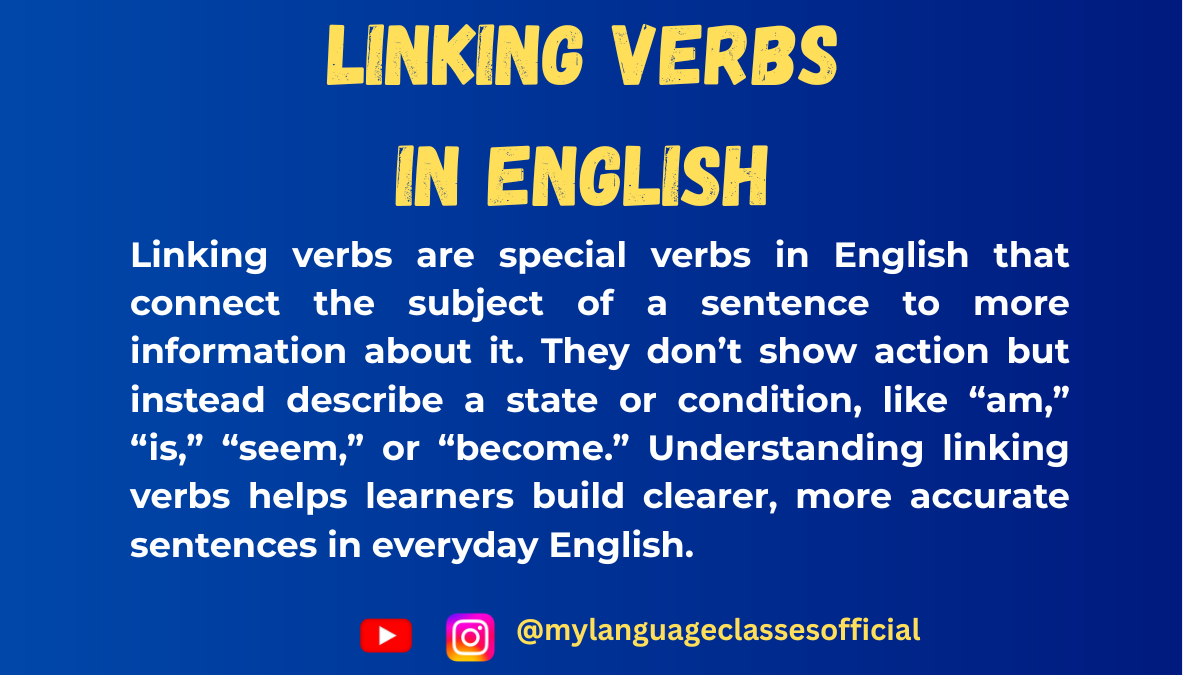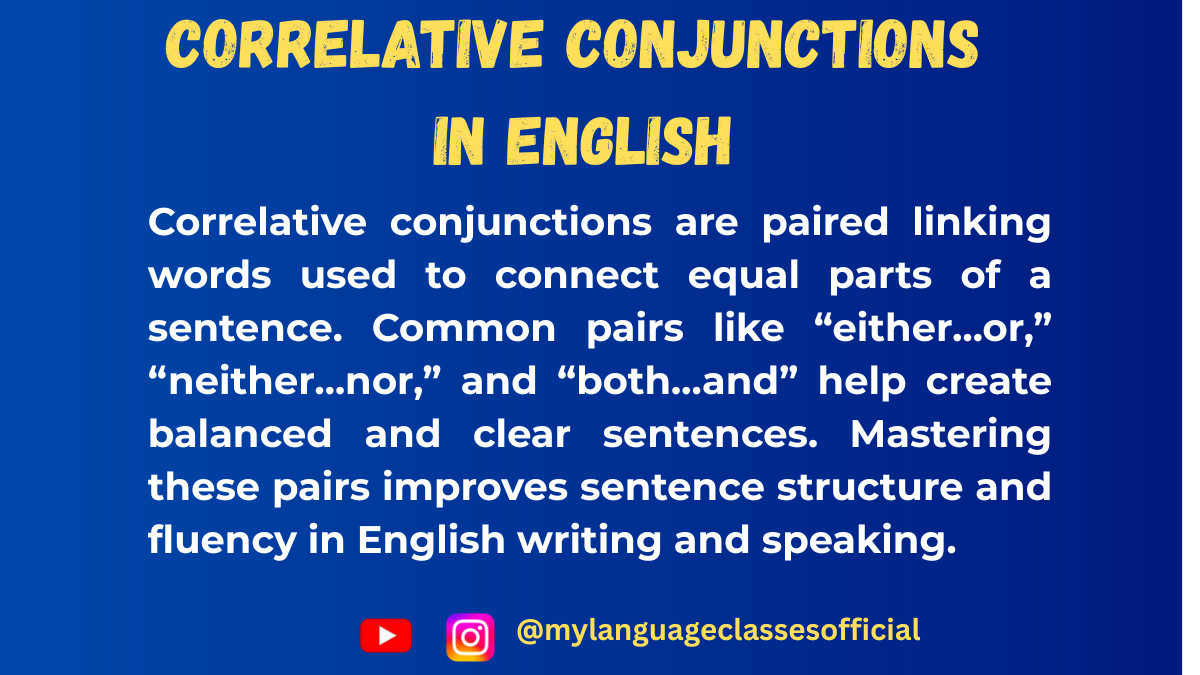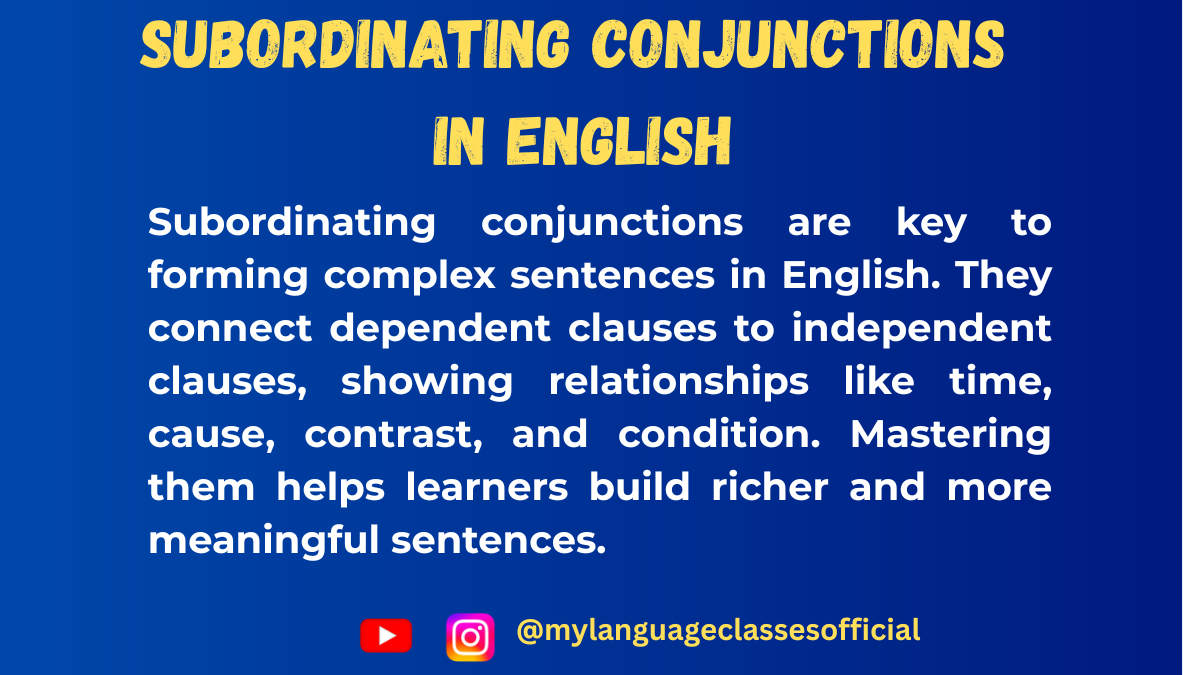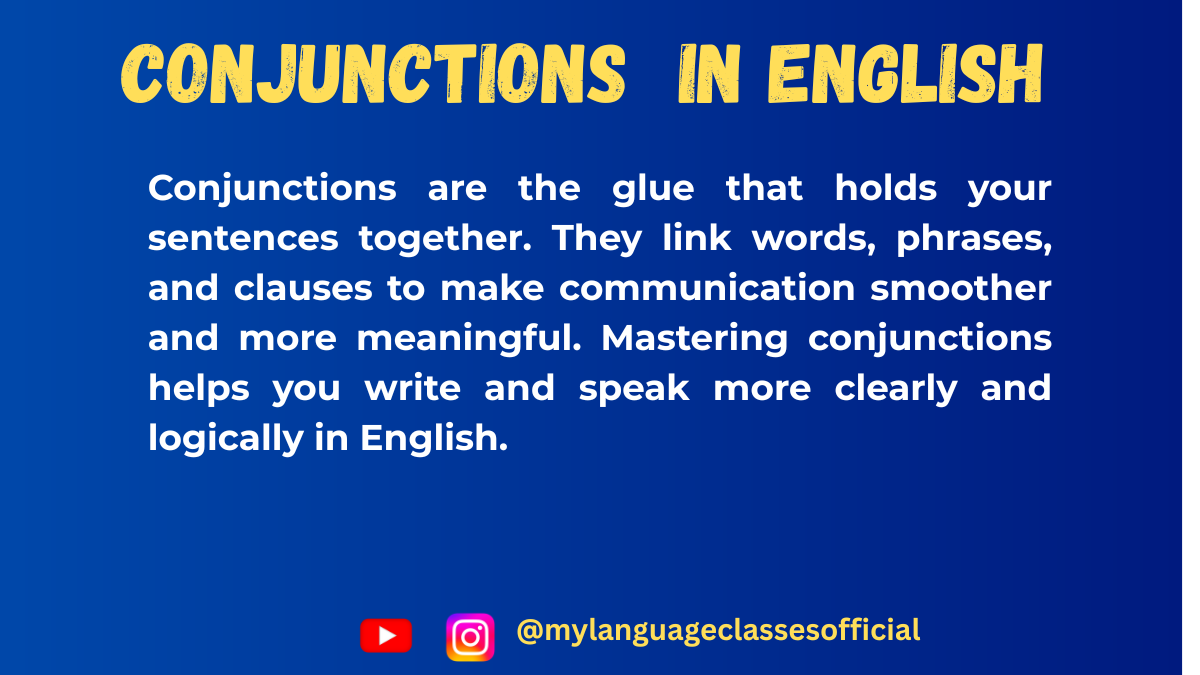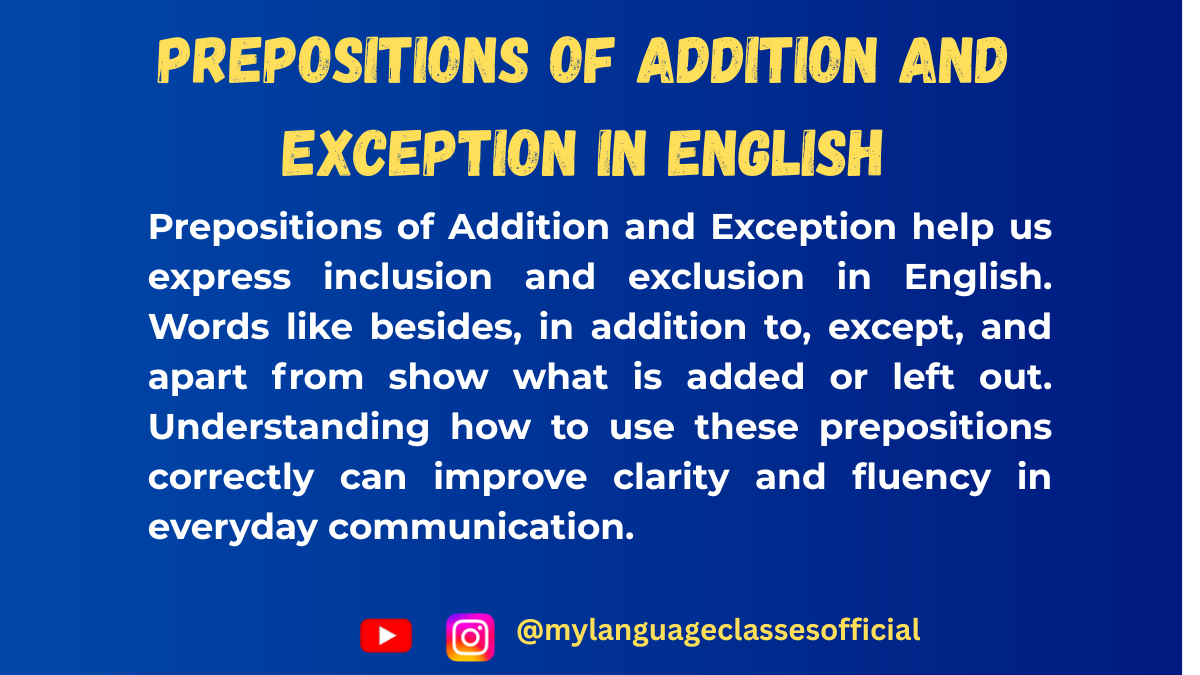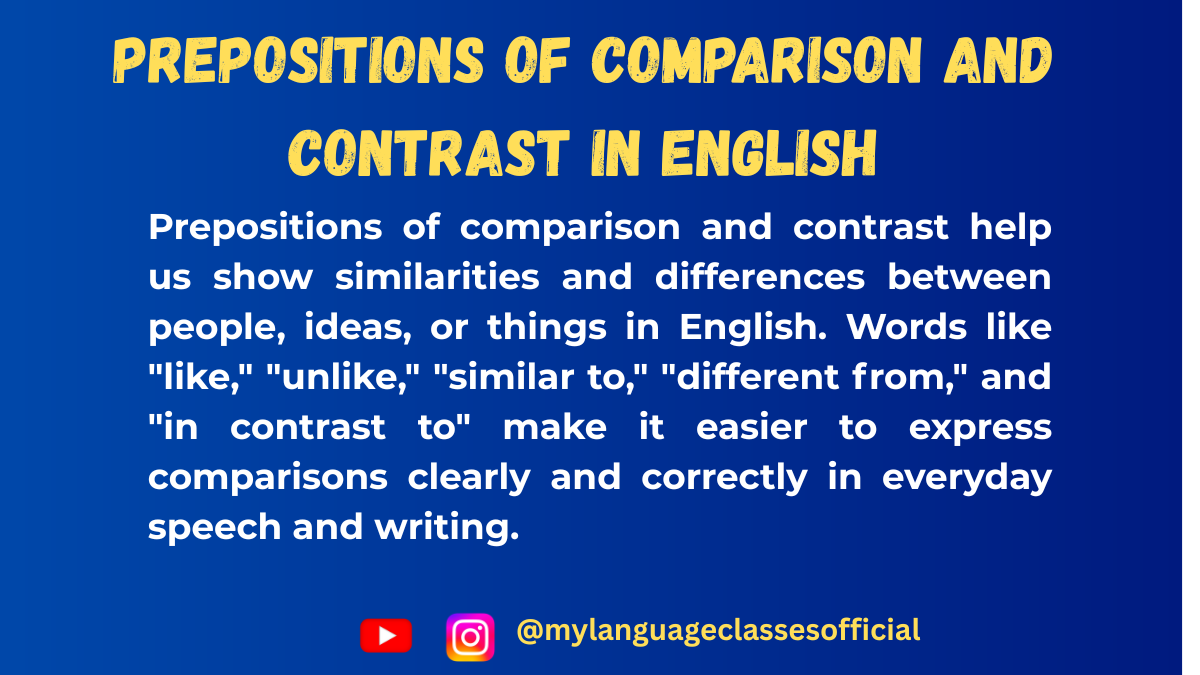Your cart is currently empty!
Tag: English Speaking Tips
-
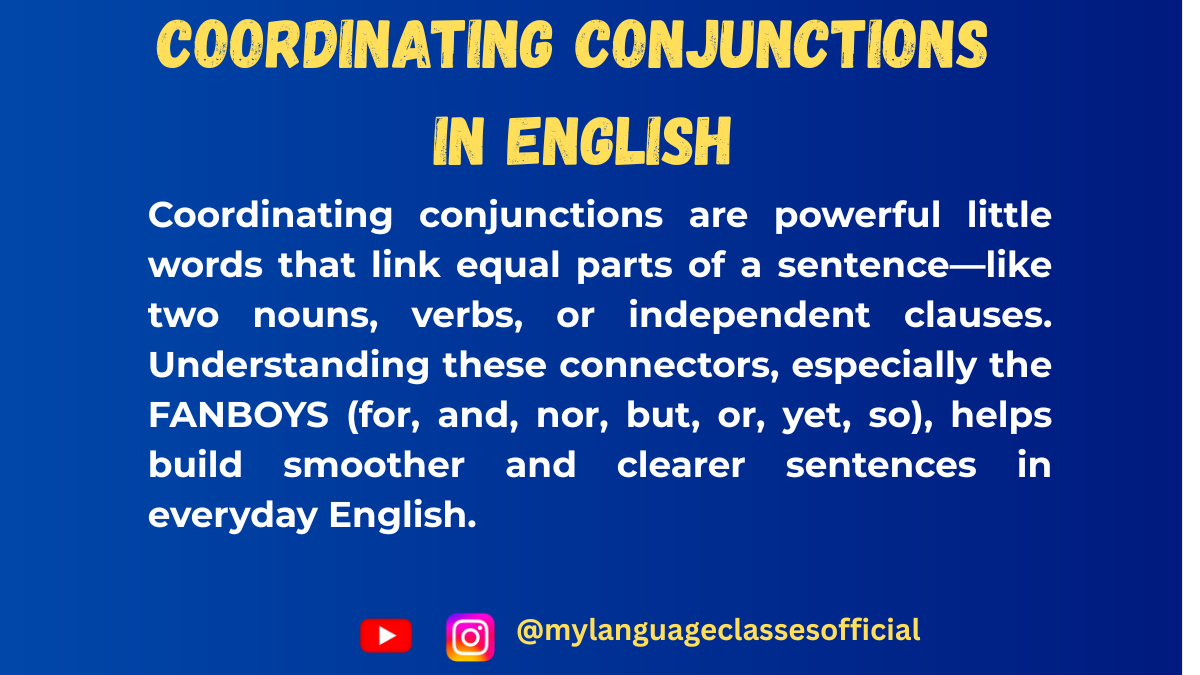
Coordinating Conjunctions in English
Coordinating conjunctions are the glue that holds sentences together. They connect words, phrases, and clauses of equal importance, making your writing and speech more fluid and coherent. Whether you’re a native English speaker or a learner, understanding how to use coordinating conjunctions effectively is essential for clear communication.
In this blog post, we’ll explore the usage of coordinating conjunctions in every possible situation, provide examples, and even test your knowledge with fill-in-the-blank exercises.
What Are Coordinating Conjunctions?
Coordinating conjunctions are words that join two or more elements of equal grammatical rank. The most common coordinating conjunctions are FANBOYS: For, And, Nor, But, Or, Yet, So. These conjunctions are used to connect words, phrases, or independent clauses.
When and How to Use Coordinating Conjunctions
Coordinating conjunctions are used in various situations to connect ideas, show relationships, and create smooth transitions in sentences. Below is a list of situations where each coordinating conjunction is used:
- For:
- Used to indicate reason or cause.
- Example: She stayed home, for she was feeling ill.
- And:
- Used to add information or join similar ideas.
- Example: I love tea, and I enjoy coffee.
- Nor:
- Used to add a negative idea or join two negative clauses.
- Example: He doesn’t like apples, nor does he like pears.
- But:
- Used to show contrast or opposition between ideas.
- Example: I wanted to go, but it started raining.
- Or:
- Used to present alternatives or choices.
- Example: Would you like tea or coffee?
- Yet:
- Used to show contrast or introduce an unexpected result.
- Example: She’s young, yet she’s very wise.
- So:
- Used to indicate a result or consequence.
- Example: It was raining, so we stayed indoors.
List of Coordinating Conjunctions with Examples
Here’s a table of all the coordinating conjunctions along with two example sentences for each:
Conjunction Usage Example 1 Example 2 For Indicates reason or cause She stayed home, for she was feeling ill. He bought flowers, for it was her birthday. And Adds information I love tea, and I enjoy coffee. She sings, and she dances beautifully. Nor Adds a negative idea He doesn’t like apples, nor does he like pears. She didn’t call, nor did she text. But Shows contrast I wanted to go, but it started raining. He’s smart, but he’s lazy. Or Presents alternatives Would you like tea or coffee? You can stay here, or you can leave. Yet Shows contrast or exception She’s young, yet she’s very wise. He’s rich, yet he’s unhappy. So Indicates result or consequence It was raining, so we stayed indoors. She studied hard, so she passed the exam.
More Example Sentences
Here are 10 additional examples to help you understand how coordinating conjunctions work in different contexts:
- I wanted to go to the park, but it was too crowded.
- She didn’t like the movie, nor did her friends.
- You can have cake, or you can have ice cream.
- He’s not only intelligent, but also very kind.
- She was tired, yet she continued working.
- I love pizza, and I love pasta.
- He didn’t study, so he failed the test.
- She bought a new dress, for she had a party to attend.
- They didn’t call, nor did they send a message.
- He’s allergic to cats, yet he adopted one.
Fill-in-the-Blanks Questions
Test your knowledge with these 10 fill-in-the-blank questions. Choose the correct coordinating conjunction from the list: For, And, Nor, But, Or, Yet, So.
- She wanted to go to the beach, _____ it started raining.
- He didn’t like the soup, _____ did he eat the bread.
- You can take the bus, _____ you can walk to the station.
- She was tired, _____ she finished her homework.
- I love reading books, _____ I enjoy watching movies.
- He didn’t study for the test, _____ he failed.
- She bought a new car, _____ her old one broke down.
- He’s not only a great singer, _____ also a talented dancer.
- Would you like tea, _____ would you prefer coffee?
- She’s very busy, _____ she always makes time for her family.
Answers to Fill-in-the-Blanks
- but
- nor
- or
- yet
- and
- so
- for
- but
- or
- yet
Things to Keep in Mind
- Equal Importance: Coordinating conjunctions connect elements of equal grammatical rank (e.g., two nouns, two phrases, or two independent clauses).
- Comma Usage: Use a comma before a coordinating conjunction when joining two independent clauses.
- Example: I wanted to go, but it was too late.
- Avoid Overuse: Don’t overuse coordinating conjunctions, as it can make your writing repetitive.
- Gender Neutrality: Coordinating conjunctions are gender-neutral and can be used in any context.
- Articles: Articles (a, an, the) are not affected by coordinating conjunctions. Use them as needed.
- Example: She bought a book and a pen.
Conclusion
Coordinating conjunctions are a fundamental part of English grammar. They help you connect ideas, present alternatives, and show relationships between words, phrases, and clauses. By mastering the use of FANBOYS, you can improve your writing and speaking skills significantly. Remember to practice regularly and pay attention to the nuances of each conjunction.
If you enjoyed this lesson, be sure to check out more posts like this on my blog at My Language Classes. Don’t forget to subscribe my YouTube channel and follow me on Instagram for the latest language learning tips and lessons. Leave a comment below to share your thoughts, or ask any questions you have about nouns.
Happy learning! 😊
- For:
-
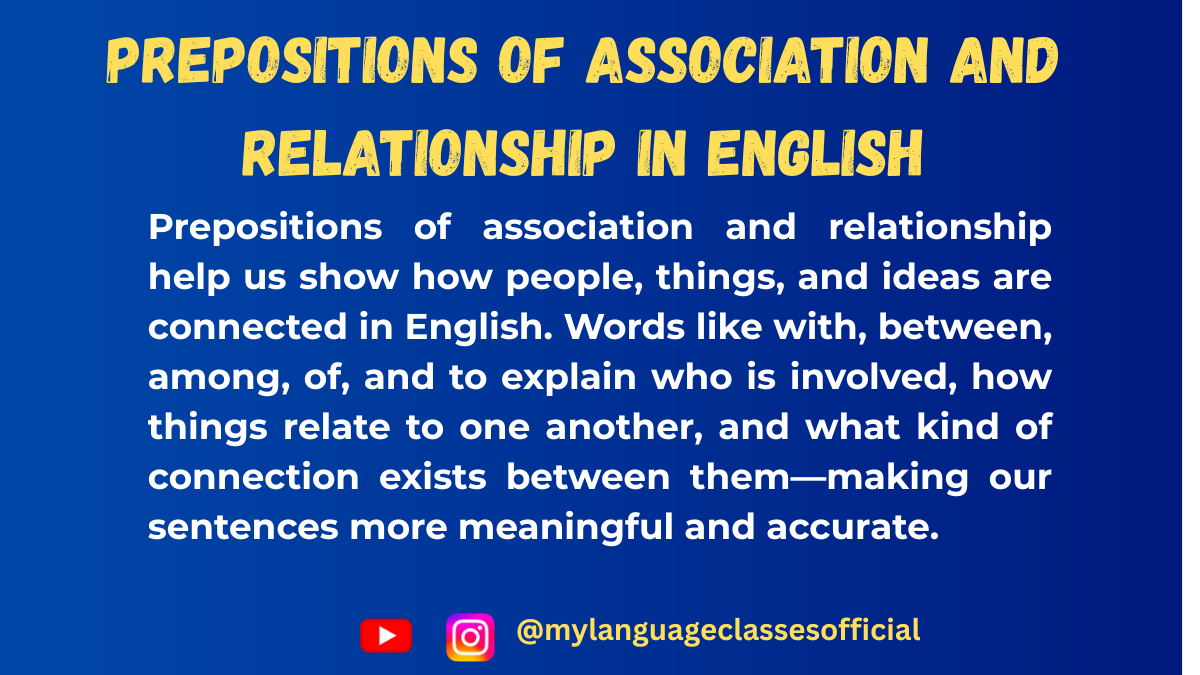
Preposition of Association and Relationship in English
Prepositions are small but mighty words that play a crucial role in connecting ideas and providing context in sentences. Among the various types of prepositions, Prepositions of Association and Relationship are particularly important because they help us describe how people, things, or ideas are connected. In this blog post, we’ll explore the usage of these prepositions in detail, provide examples, and offer practical exercises to help you master them.
What Are Prepositions of Association and Relationship?
Prepositions of Association and Relationship are used to indicate a connection or relationship between two or more entities. These prepositions help clarify how people, objects, or concepts are linked, whether through partnership, belonging, or interaction.
Usage of Prepositions of Association and Relationship
These prepositions are used in various contexts, including:
- Partnerships and Collaborations: To describe working or being together.
- Example: She works with a team of experts.
- Ownership or Belonging: To show possession or association.
- Example: This is the book of my friend.
- Relationships Between People: To describe familial, romantic, or social connections.
- Example: He is married to Sarah.
- Connections Between Objects or Ideas: To explain how things are related.
- Example: The key to success is hard work.
- Membership or Inclusion: To indicate being part of a group.
- Example: She is a member of the club.
- Origin or Source: To show where something or someone comes from.
- Example: This gift is from my grandmother.
List of Prepositions of Association and Relationship
Here’s a table of common prepositions of association and relationship, along with example sentences:
Preposition Example Sentences With 1. She went to the party with her friends.
2. He is collaborating with a renowned scientist.Of 1. The color of the sky is blue.
2. This is a picture of my family.To 1. She is married to a doctor.
2. The answer to the question is simple.From 1. This letter is from my teacher.
2. He hails from a small village.For 1. This gift is for you.
2. She has a deep love for animals.About 1. They were talking about the project.
2. This book is about ancient history.Among 1. The secret was shared among friends.
2. She was among the top performers.Between 1. The agreement between the two companies was signed.
2. The conversation between them was intense.By 1. The book was written by a famous author.
2. The painting was created by an artist.Against 1. She leaned against the wall.
2. The decision was against his wishes.
More Example Sentences
- She is always with her best friend.
- The sound of the waves is soothing.
- He is loyal to his team.
- This recipe is from my grandmother.
- I bought a gift for my sister.
- They were arguing about the rules.
- The prize was divided among the winners.
- There is a strong bond between the twins.
- The song was composed by a talented musician.
- The protest was against the new policy.
Fill in the Blanks
Test your understanding by filling in the blanks with the correct preposition of association and relationship:
- She is traveling ___ her colleagues.
- This is a photo ___ my childhood.
- He is always kind ___ animals.
- The letter was ___ the manager.
- The discussion was ___ the new project.
- The cake was shared ___ the children.
- The agreement ___ the two parties was finalized.
- The novel was written ___ a famous author.
- She stood ___ the door, waiting for him.
- The decision was ___ his will.
Answers to Fill in the Blanks
- with
- of
- to
- from
- about
- among
- between
- by
- against
- against
Things to Keep in Mind
- Articles and Gender: Prepositions of association and relationship are not affected by gender or articles. They remain the same regardless of whether the noun is masculine, feminine, singular, or plural.
- Example: with the boy, with the girl, with the books.
- Context Matters: The choice of preposition depends on the context of the sentence. For example, with is used for companionship, while of is used for possession.
- Avoid Overusing Prepositions: While prepositions are essential, overusing them can make sentences clunky. Ensure each preposition adds value to the sentence.
- Practice Regularly: The more you practice, the more natural using these prepositions will become.
Conclusion
Prepositions of Association and Relationship are indispensable tools for expressing connections and relationships in English. By understanding their usage and practicing regularly, you can enhance your communication skills and write or speak more effectively. Remember to pay attention to context and keep practicing with examples and exercises.
If you enjoyed this lesson, be sure to check out more posts like this on my blog at My Language Classes. Don’t forget to subscribe my YouTube channel and follow me on Instagram for the latest language learning tips and lessons. Leave a comment below to share your thoughts, or ask any questions you have about nouns.
Happy learning! 😊
- Partnerships and Collaborations: To describe working or being together.
-
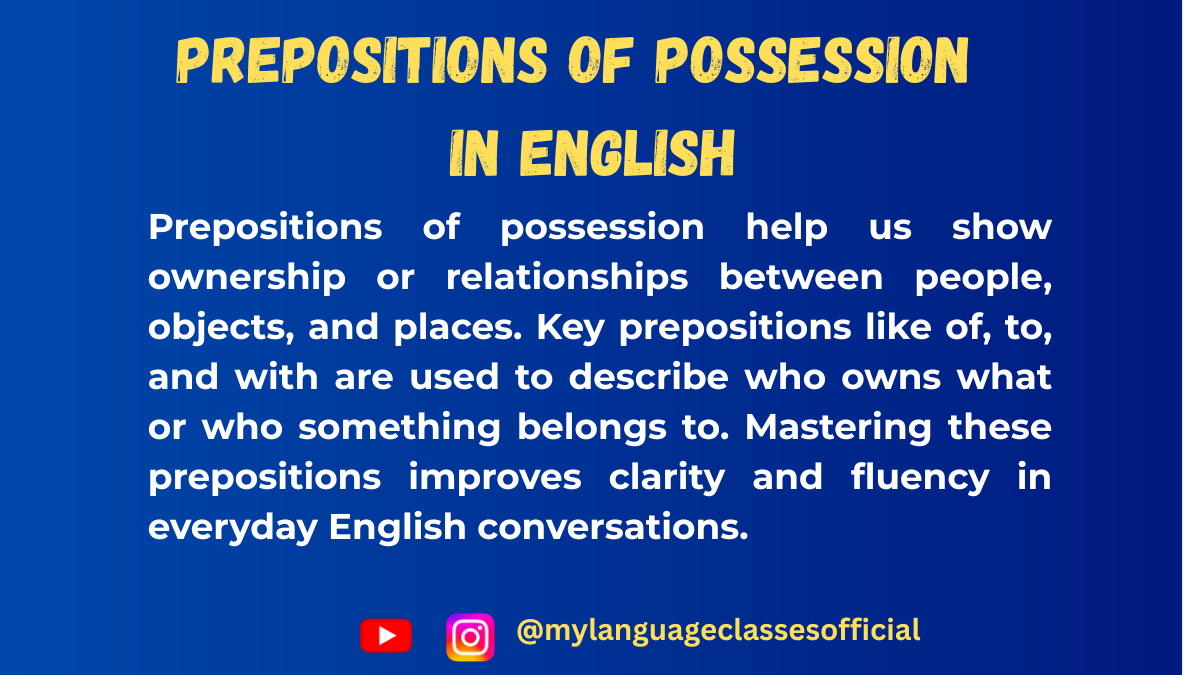
Prepositions of Possession in English
Prepositions of possession are words that indicate ownership, relationship, or belonging. They show how something or someone is related to another person or thing. In this blog post, we will discuss prepositions of possession in detail, their different usages, and provide numerous examples to help you master their application.
List of Prepositions of Possession
Below is a list of prepositions of possession along with their meanings and example sentences:
Preposition Meaning Example Sentence 1 Example Sentence 2 Of Indicates belonging or relation The pages of the book are torn. She is a friend of mine. To Shows possession, especially relationships This pen belongs to me. The key to the door is lost. With Indicates possession through an attribute or characteristic The boy with blue eyes is my cousin. She is the one with the golden necklace. By Can show authorship or ownership This novel is written by J.K. Rowling. The house by the river is beautiful. From Sometimes used to show possession or origin This advice came from my father. The letter from John is on the table. In Can indicate possession in certain contexts The error in the report must be corrected. There is wisdom in his words. For Can imply possession or association This gift is for my mother. The medal for bravery was awarded to him. About Sometimes used to indicate possession or relation The book about Shakespeare is very informative. There is a rumor about the new manager.
Situations Where Prepositions of Possession Are Used
- Indicating Ownership:
- Example: The cover of the book is blue.
- Describing Relationships:
- Example: He is a friend of mine.
- Attributing Characteristics:
- Example: The girl with curly hair is my sister.
- Denoting Authorship:
- Example: The poem by Robert Frost is inspiring.
- Showing Source or Origin:
- Example: The idea from our teacher was brilliant.
- Expressing Purpose or Benefit:
- Example: The scholarship for international students is available.
- Connecting Items with a Relationship:
- Example: The door to the basement is locked.
- Discussing Characteristics:
- Example: The car with tinted windows looks stylish.
- Using Articles with Prepositions of Possession:
- Example: A book of knowledge is valuable.
- Considering Gender in Possession:
- Example: The daughter of the king is the princess.
More Example Sentences
- The rules of the game are easy to understand.
- The key to my house is missing.
- She is the woman with the red umbrella.
- The novel by Charles Dickens is a classic.
- The letter from my mother made me emotional.
- The decision in the meeting was unanimous.
- The gift for my sister arrived today.
- There is a rumor about the new project.
- The map of the city is detailed.
- The teacher with a kind heart always helps students.
Fill in the Blanks
- The color ___ the car is red.
- The necklace ___ diamonds is expensive.
- The painting ___ Leonardo da Vinci is famous.
- This letter is ___ my best friend.
- The answer ___ the question is correct.
- The story ___ Harry Potter is interesting.
- The dog ___ the brown spots is friendly.
- The scholarship ___ outstanding students is competitive.
- The door ___ the balcony is open.
- The sound ___ the guitar is soothing.
Answers
- of
- with
- by
- from
- to
- about
- with
- for
- to
- of
Things to Keep in Mind
- Context Matters: The same preposition can have different meanings in different sentences.
- Articles (a, an, the): These should be used correctly with prepositions of possession.
- Gender Awareness: When referring to possession related to people, gender-specific words like his, her, or their may be necessary.
- Fixed Expressions: Some prepositions of possession appear in fixed expressions, like a friend of mine.
- Word Order: Ensure proper sentence structure when using prepositions of possession.
Conclusion
Mastering prepositions of possession is essential for fluency in English. They help establish relationships between people, objects, and ideas. By understanding their different uses and practicing with examples, you can use them naturally in conversations and writing. Keep practicing, and soon, using prepositions of possession will become second nature!
If you enjoyed this lesson, be sure to check out more posts like this on my blog at My Language Classes. Don’t forget to subscribe my YouTube channel and follow me on Instagram for the latest language learning tips and lessons. Leave a comment below to share your thoughts, or ask any questions you have about nouns.
Happy learning! 😊
- Indicating Ownership:
-
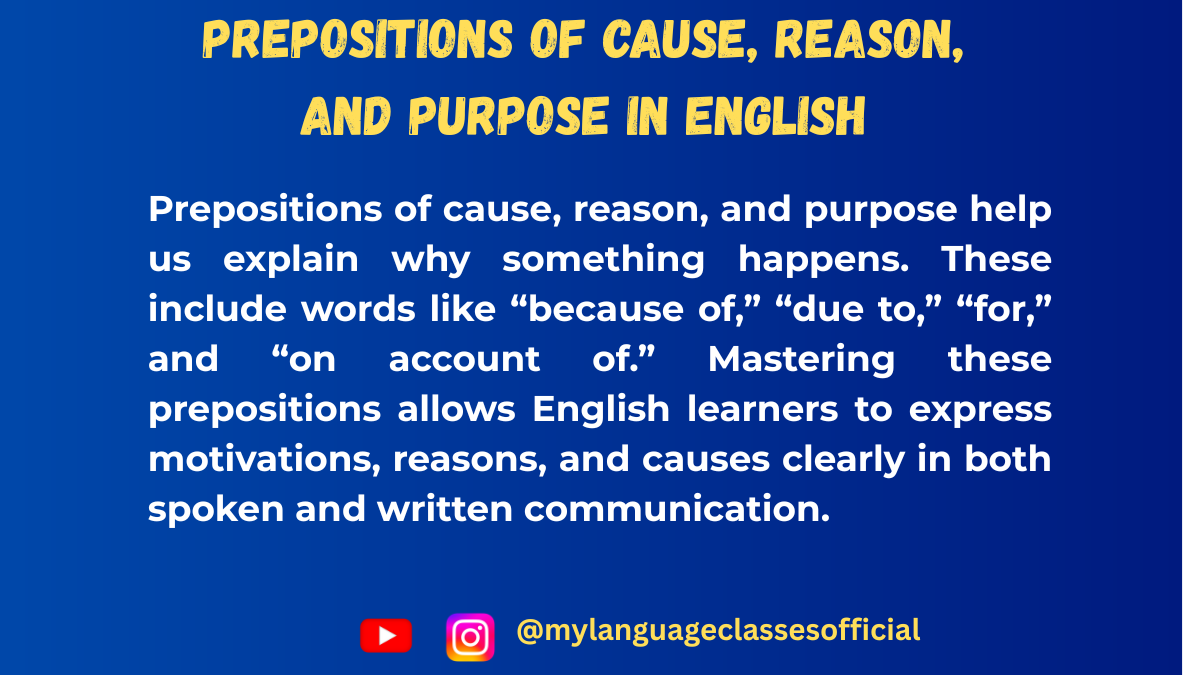
Prepositions of Cause, Reason, and Purpose in English
Introduction
Prepositions play a crucial role in English grammar as they help establish relationships between different elements in a sentence. Among them, prepositions of cause, reason, and purpose clarify why something happens, the reason behind an event, or the intention behind an action. Understanding their usage correctly enhances fluency and accuracy in writing and speaking.
Usage of Prepositions of Cause, Reason, and Purpose
1. Prepositions of Cause
Prepositions of cause explain why something happens. They indicate the factor that caused a particular outcome.
Common Prepositions of Cause:
- Because of
- Due to
- On account of
- Owing to
Examples:
- The match was postponed because of the heavy rain.
- She failed the test due to a lack of preparation.
2. Prepositions of Reason
Prepositions of reason indicate the reason behind an action. They explain why a particular situation exists.
Common Prepositions of Reason:
- For
- From
- Out of
Examples:
- He was praised for his honesty.
- She started crying out of frustration.
3. Prepositions of Purpose
Prepositions of purpose express the goal or aim of an action.
Common Prepositions of Purpose:
- For
- To
- With a view to
Examples:
- She studies hard for a better future.
- He left early to catch the train.
Situations Where Prepositions of Cause, Reason, and Purpose Are Used
- Explaining consequences (e.g., “The flight was delayed because of bad weather.”)
- Stating reasons behind actions (e.g., “She apologized for her mistake.”)
- Indicating an emotional or physical reaction (e.g., “He shivered from cold.”)
- Expressing motivations and intentions (e.g., “He works hard for success.”)
- Providing justifications (e.g., “She was fined on account of reckless driving.”)
List of Prepositions of Cause, Reason, and Purpose with Example Sentences
Preposition Type Example Sentence 1 Example Sentence 2 Because of Cause The flight was canceled because of fog. He missed school because of illness. Due to Cause The event was postponed due to rain. The project failed due to mismanagement. On account of Cause The road was closed on account of construction. She resigned on account of personal reasons. Owing to Cause The traffic was heavy owing to an accident. The delay was owing to technical issues. For Reason He received an award for bravery. She was admired for her kindness. From Reason He suffered from a severe headache. She is recovering from an injury. Out of Reason She spoke out of anger. He donated money out of generosity. To Purpose He went to the store to buy groceries. She practices daily to improve her skills. For Purpose He exercises for good health. She took a course for career growth. With a view to Purpose She is saving money with a view to buying a house. He trained hard with a view to winning the championship.
More Example Sentences
- She couldn’t attend the meeting because of an emergency.
- The project was unsuccessful due to insufficient funding.
- They were punished for breaking the rules.
- He retired early on account of health issues.
- She screamed out of fear.
- The campaign was launched with a view to raising awareness.
- He is respected for his contributions to science.
- The doctor prescribed medicine for flu symptoms.
- She skipped lunch owing to her busy schedule.
- He studied abroad to gain international exposure.
Fill in the Blanks
- The match was canceled ___ heavy rain.
- He was awarded a medal ___ his bravery.
- She left early ___ pick up her kids.
- The school was closed ___ bad weather.
- He donated money ___ kindness.
- She was fined ___ reckless driving.
- He started crying ___ frustration.
- She took this job ___ a better future.
- He trained hard ___ winning the championship.
- The company shut down ___ financial losses.
Answers:
- Because of
- For
- To
- Due to
- Out of
- On account of
- Out of
- For
- With a view to
- Owing to
Things to Keep in Mind
- “Because of” vs. “Due to”: “Due to” is often followed by a noun, while “because of” is more flexible.
- “For” can indicate both reason and purpose, so its meaning depends on context.
- “Owing to” and “on account of” are formal and commonly used in written English.
- “To” always indicates purpose, while “from” often signifies the origin of a reason.
- Double-check preposition usage in formal writing, as incorrect usage can alter meaning.
Conclusion
Mastering prepositions of cause, reason, and purpose is essential for effective communication. These prepositions help clarify why actions happen and the intent behind them. By understanding their nuances and practicing their use, learners can improve their fluency and accuracy in English. Keep practicing with different examples to develop confidence in using these prepositions correctly!
If you enjoyed this lesson, be sure to check out more posts like this on my blog at My Language Classes. Don’t forget to subscribe my YouTube channel and follow me on Instagram for the latest language learning tips and lessons. Leave a comment below to share your thoughts, or ask any questions you have about nouns.
Happy learning! 😊

